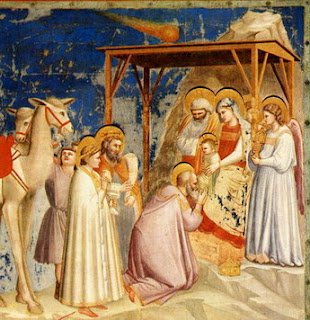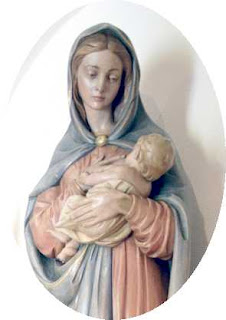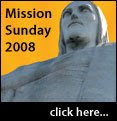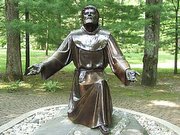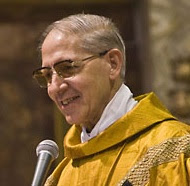 I don’t normally reproduce the contents of a press conference for this reflection, but I was impressed at what the new Father General of the Jesuits, Fr. Adolfo Nicolas, had to say, so I reproduce it below.
I don’t normally reproduce the contents of a press conference for this reflection, but I was impressed at what the new Father General of the Jesuits, Fr. Adolfo Nicolas, had to say, so I reproduce it below.
God bless,
Sr. Janet
“First of all, I want to thank you for the interest you have shown in the Society of Jesus, in this General Congregation, and the positive view that you are taking of me.
I understand the difficulties you have in finding information. I am an unknown. Spanish journalists look for treasures where are there are none; they ask people, hoping for a small bit of drama, if I actually am the third of three brothers – in reality I am the third of four; if I studied in the Balmes Institute – I did but only for one year when I was 10 years old and I was suspended from two or three subjects…
I hope that in the future it will not be so difficult to find information, since we will be able to leave aside this less interesting material and inform you about what is more important: what we do in this present world, this church, this moment in our history.
These days I have found things in the press which are helpful, but also things that are not helpful. Among those that are least helpful, for example, is the search for conflict between Jesuits and the Holy Father, between Jesuits and the Vatican. I do not believe this to be true. The Society of Jesus has always been in communion with the Holy Father and we are happy to be so. Between spouses there are always difficulties; if any of you who are married say there are not I would not believe you. Only people who love each other can hurt each other. When as part of that relationship there is an effort to work together, difficulties can arise and that is normal. If any of you are married you know of what I speak. The Society of Jesus wants to work with the Holy See and obey the Holy Father. This has always been the common understanding among us. It has always been so, it has not changed nor do I believe it will change.
Some in the press have said that there is a theological distance between myself and Benedict XVI, which some wish to sensationalize. When I was a student I studied the works of Professor Ratzinger; in Tokyo we studied his books because he is a great professor. His books were interesting, they had creativity and inspiration which we all appreciated at that time. I speak of the years 1964-1968, when I was studying in Tokyo, and the works of Ratzinger were common among us. Later, when I came to Rome it was the same. The name of Ratzinger was that of a great teacher. And in Germany – although he did not teach in Frankfurt – all read his books.
Thus the distance is more something theoretical in people’s imagination. This is about a continuing conversation, because I think that theology is always a dialogue. What is most important is the search for the truth, the search for the truth inspired in the Word of God, in the life of the Church, in the life of Christians. In this dialogue one might perhaps find differences in some matters, but always part of the mutual search for the truth.
Some journalists say that I am like Arrupe, or like Kolvenbach, half and half, up to fifty percent; it would not be a surprise if someone said I am 10% Elvis Presley. All of this is false. I am not Fr. Arrupe. I love Fr. Arrupe, I admire him, he has influenced me, I had him as my Superior for four years in Japan, and in fact I had know him earlier, in studies, when he talked to us about the atomic bomb in Hiroshima…..but I am not Arrupe. So, who am I? If you ask I will say that I have been created for the reality in which I find myself, I am in process, in fieri, until I become what God wants of me, as with all of us. This applies to the relations with the Holy Father or to what comes out of this General Congregation. All depends on the ability I have to respond or not to respond to that reality and those who are around me and that which the General Congregation asks of me. This is always the open question.
Something of interest to the press has been my relationship with Asia. Here you can see a map which we put together a month ago in Manila, in the region where I have worked in recent years. This is a region that extends from Japan to China to Australia and to Micronesia in the Pacific. The greater part of my life has been lived in Asia, where I arrived when I was 24 years old, after I studied philosophy in Alcala. And Asia has been a challenge, a real challenge, in many ways.
The first years in Japan were not easy, not so much because of the raw fish – the Japanese diet is good – nor the language with which there was not much difficulty, nor even writing in Japanese characters. These are external things. The difficulties were more profound. The world was not as I thought of it in Spain, nor was it my way of seeing things, including the faith. Things that I considered commonly understood in Spain were not as they were in Spain. The encounter with a world so completely different put into question matters that I had considered givens. This became a normal experience, but it was difficult.
In this context I had to study theology, and it was most interesting. The task was one of reformulating faith itself not only in the context of Vatican II but in the context of Asia, of Japan, in a context where Buddhism and Shintoism and other religions have had a profound influence.
I believe that Asia has changed me, I hope for the good – the Japanese will have to decide that – it has changed me and has helped me to understand others, to accept what is different and try to understand why it is different, in what lies the difference and how I can learn from that difference.
And then it has taught me to smile at the difficulties, at human imperfection, the human reality. In Spain I was a little intolerant, thinking in terms of order, of commands, because I thought of religion as fidelity to religious practices, and in Japan I learned that true religiosity is more profound, that one must go to the heart of things, to the depths of our humanity, whether we are speaking of God or we are speaking of ourselves and of human life. This is a way of entering into a diverse world. I have learned that I could smile before the difficulties, something that in Spain would have made me very nervous. Human life is this way, we people are this way; imperfections are so natural that it is necessary to accept them from the very beginning.
The Japanese have the reputation of working 24 hours a day; yes, but they do it slowly, slowly; they don’t work like Americans, the French or much less like Spaniards, who perhaps work one hour, but very intensely. It is a different kind of rhythm, and this applies not only to work but to the way of understanding people, without imposing on them. It scandalizes them that we are so strict, intolerant, and incapable of accepting diversity; this is a scandal to them.
This was truly a challenge for us who came with the naivete of those born and educated in a country like Spain. Because of this I believe that Asia can enrich the universal church a great deal. Unfortunately we Jesuits are few in Asia and we have written little about this. Japan can contribute a great deal with her culture and her way of confronting problems with depth. If we look at Buddhism we see that it itself has changed a great deal throughout Asia; from India to Sri Lanka the south has one Buddhist tradition, but the north has another, the Mahayana which was open to a variety of situations and arrived in Japan where it found a way of entering deeply so that Zen took on Japanese citizenship. Questions were as deep as possible; all was questioned. We can all learn from this world, maintaining our own calm while facing the other as given to us.
Then there is China. China is a world with such a breadth of cultures and diversity of language, with more than 27 ethnic groups in the south of China where they speak Chinese mixed with Arabic, a world for which it is incredible to imagine a way to provide some kind of administrative unity. Then there are Korea and Vietnam, with their great diversity; the Philippines, which is sometimes called the Italy of Asia, because they have that same sense of humor and of life, and a sense of law that is a little broader that that of other countries. There is a saying that for them traffic laws are not laws but recommendations. his understanding of life I believe is good for the rest of Asia, as a kind of profound Asian humanism.
Indonesia is part of this same tradition. I also should include that Australia, with its Western character, has taken as its mission to be a bridge between Asia and the West. I have found great assistance and cooperation in Australia in the development of programs. Then we have new missions, like Burma, East Timor and Cambodia, new because they were closed; Jesuits had been expelled from Cambodia and from Burma by the military government. In Timor there had been a small group which has changed a great deal since independence. Now we have new vocations, but all is beginning anew. All of these nations bring new challenges and tasks.
About the future there is little I can say. The reason is simple: I have just begun. When in the Congregation meeting they speak of Father General, I always think they mean Fr. Kolvenbach; I do not yet realize that it is me. My current attitude is to listen, listen and obey. As you know, the General Congregation has authority over Fr. General. During the General Congregation I am subject to the Congregation. If the Congregation tells me what needs to be done, what direction to take in the future, I should obey, that is my mission. Therefore what is important to me now is to know what the General Congregation wishes; as well as how to respond to the challenges that the Holy Father has sent us, about which we are reflecting very seriously, so as to give a response that can help the Church, not ourselves. I hope to meet with the Holy Father soon whenever he calls me to have an initial meeting. After all this, when the Congregation Fathers have gone, I will begin to work, to see how to respond and make all of this into reality.
I hope that then we can have a meeting to respond to your questions. Now I have no answers; I can only respond “this depends, that depends….” In the dialogue which we will have I hope to follow the principles of Ghandi, who said that when we speak, it first must be true, because if it is not true it is not interesting; second, it must be charitable, and do good; and third, it must do good for others. Thus, news that, although true, does not do good but creates misunderstandings will not be interesting, and if it does not help people I think it is worthless.
I intend to be transparent. I have learned this in Indonesia, from a couple who were not Christians. In a context where there is fear of evil spirits, this couple took transparency as their spirituality to defend themselves against those threats, so that any evil that came passed on without leaving a trace and the good that arrived was passed on to others. I think this is a symbol we should keep in mind. Transparency is an attitude of responsibility for the good of others, not for ourselves. It is not so important what people think of me; more important is the good of others.”





